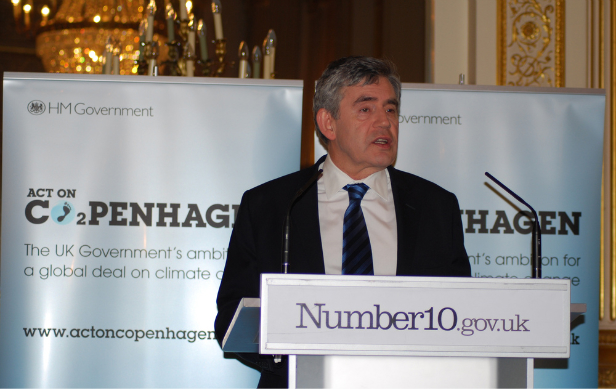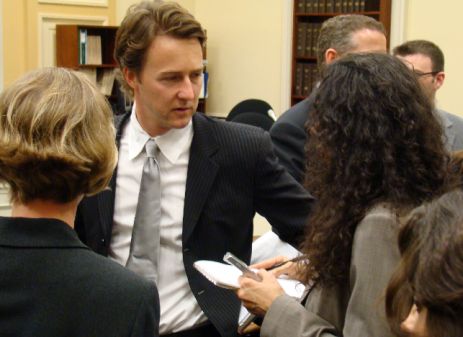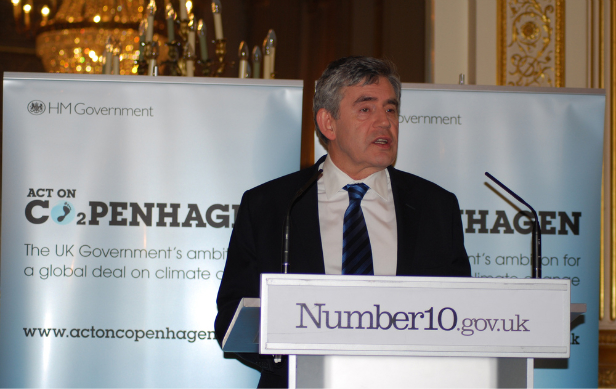 British Prime Minister Gordon Brown has committed his politically battered government to sealing a climate deal in Copenhagen this year. Above, Brown speaks at the Major Economies Forum, held this past weekend in London.UK Dept. of Energy & Climate Change
British Prime Minister Gordon Brown has committed his politically battered government to sealing a climate deal in Copenhagen this year. Above, Brown speaks at the Major Economies Forum, held this past weekend in London.UK Dept. of Energy & Climate Change
It certainly caught the eye. “The world’s future is being decided this weekend” ran the headline over an op-ed piece in Sunday’s Observer.
And the byline was pretty compelling too: Nicholas Stern, now Lord Stern, the author of the groundbreaking report bearing his name on the economics of climate change.
The rather more sober text of the article did not quite bear out the dramatic headline, as the big climate decisions aren’t expected to come until the Copenhagen climate conference in December. But a meeting in London last weekend was crucial nonetheless. And it did make some progress.
Ministers from the 17 key developed and developing countries that make up the Major Economies Forum (MEF) got together to try to chart a course through the deadlock bedevilling the formal UN negotiations on a new deal to combat global warming. After seven intense weeks of negotiations so far this year, held at four sessions in Bonn and Bangkok under the auspices of the UN Framework Convention on Climate Change, the major issues are nowhere near being resolved.
Worse, the negotiating text remains an unwieldy, lengthy document studded with hundreds of square brackets, denoting disagreement. Only five negotiating days are left, in Barcelona at the beginning of next month, before the representatives of the world’s governments fly to the Danish capital.
With little chance of this calamitously cumbersome process reaching anything like a conclusion, most of the hopes of sealing a deal in Copehagen rests on the shoulders of the ministers who attended the London meeting, and those of their nation’s leaders. The MEF has proved invaluable in providing a place where delegates from these key countries can talk and try to move towards agreement outside the constricting confines of the UN negotiations.
That must be enough to set George W. Bush turning in his political grave, for the Forum is a direct descendent of one he set up in 2007 (under the slightly different name of the Major Emitters Forum) to try to block progress on climate change by bypassing the UN altogether.
An MEF summit this summer took some of the most significant, if still small steps forward of the year so far, with participating countries agreeing for the first time that the rise in global temperatures should be halted at two degrees centigrade above pre-industrial levels. Rich countries agreed, again unprecedentedly, to slash emissions of greenhouse gases by 80 percent by 2050, while developing nations broke new ground by accepting that their own pollution should “peak as soon as possible.”
The London gathering also modestly moved things forward. Both U.S. climate envoy Todd Stern and British Energy and Climate Change Secretary Ed Miliband — both of whom, privately and publicly, were pessimistic beforehand about the prospects of agreement — emerged more hopeful.
While stressing that “this is absolutely not a done deal, it remains in the balance,” Miliband went on: “today this feels a more doable proposition than it was yesterday.” Stern added, with similar cautious optimism: “More progress needs to be made, but we think that something can be done.”
In an important move, the rich countries have quietly softened their stance on insisting that all nations agree that global emissions should be cut by 50 percent by 2050. Developing countries had refused to agree to the target, fearing it would be used to justify forcing big cuts on them in future. As one senior source put it: “Discussions on 2050 have been eating up time that could be more usefully spent on determining what we do before we are all dead.”
Eight MEF working groups will shortly announce the results of talks on developing and sharing clean technologies. There was productive discussion on how a plethora of national programs and commitments, by both developed and developing countries, could be fitted into a global deal.
There was even a little progress on the thorniest issue of all, with participants reaching “substantial agreement” that “significantly scaled up finance” will be needed to help the poorest countries reduce their own emissions and adapt to the potentially devastating effects of climate change. (Those hopes, alas, were set back when European finance ministers on Tuesday again reneged on a promise to put money on the table.)
British Prime Minister Gordon Brown issued a call to action (“we cannot compromise with the catastrophe of unchecked climate change, some must compromise with each other”) and made clear his on commitment to “work tirelessly…to negotiate a deal.” The first head of government to commit to going to Copenhagen, he is already intensely lobbying his fellow leaders to join him there: Downing Street says that several have privately agreed also to go, but will not identify them.
Successful UN negotiating meetings need two things among others — some degree of trust between the major players, and one national leader who will push hard for agreement.
The MEF is beginning to provide the former, and Gordon Brown could become the latter. The odds against agreement in Copenhagen remain long, but they shortened just a tiny bit last weekend.
On the Web:
- London MEF Meeting Official Communique (PDF)
- Britain’s battered leader is set on saving the world (Grist, July 6, 2009)
- Britain’s Labour government places big bet on low-carbon future (Grist, July 22, 2009)




